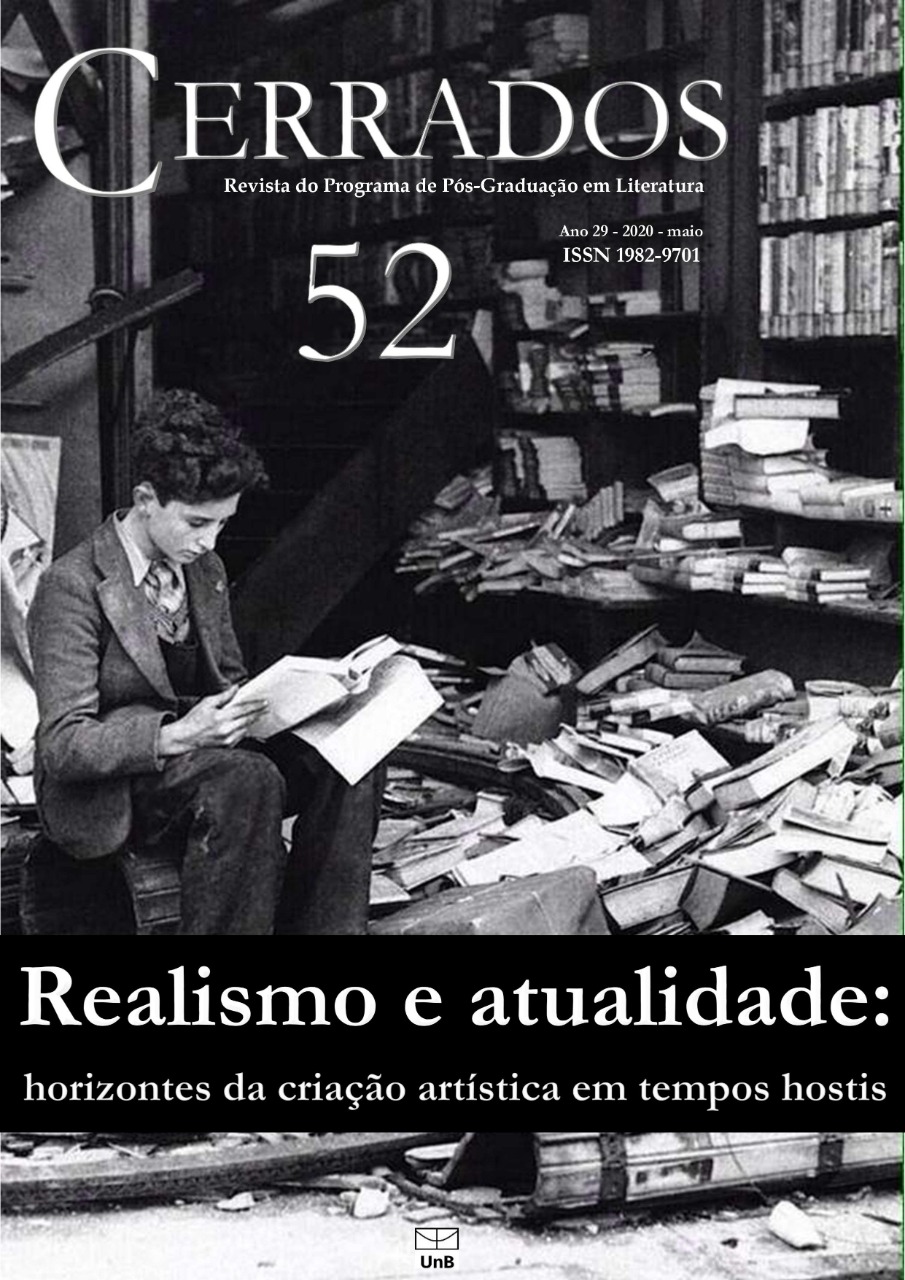DISTOPIA E MODERNIDADE: O PESSIMISMO TEM SEU LUGAR
Keywords:
Literatura. História. Utopia. Distopia. Georg Lukács.Abstract
The configuration of the literary genres can be understood as the encounter of the work of art and the History. Based on this statement and on Georg Lukacs' theory, this work investigates the concept of art of this author's and the relation between literary genre and History, so that, this text will present and discuss some questions related to the dystopias, as the origin of this literary genre, its emergence on our society, as well as its possibilities in capitalist society.
Downloads
References
BERRIEL C. E., Editorial da Morus. Revista Morus ”“ Utopia e Renascimento - Utopia e Renascimento 2, 2005, p. 4-10.
_____________. Marx: a utopia como ética da revolução. Revista Morus ”“ Utopia e Renascimento, nº 12, 2017, p. 47-56.
CLAEYS, Gregory. The Origins of Dystopia: Wells, Huxley and Orwell. In: CLAEYS, Gregory. (ed.). The Cambridge Companion to Utopian Literature. Cambridge: Cambridge University Press, 2010.
_________________. Dystopia: A Natural History. A study of modern despotism, its antecedents, and its literary diffractions. Oxford: Oxford University Press, 2017.
LUKÁCS, G. Estetica, vol.2. Barcelona: Grijalbo, 1972.
MORE, T. Utopia. Organização, introdução e notas George M. Logan e Robert M. Adams. Trad. Jefferson Luiz Camargo e Marcelo Brandão Cipolla. São Paulo: Martins Fontes, 1999.
JEMISIN, N. K. 100 anos de distopia: como o pessimismo virou uma febre literária, O Estado de S. Paulo: 21 dez. 2019. Entrevista concedida a André Cáceres. Disponível em:<https://alias.estadao.com.br/noticias/geral,100-anos-de-distopia-como-opessimism
o-virou-uma-febre-literaria,70003131748.> Acesso em: 27 dez. 2019.
LEPORE, J. A Golden Age for Dystopian Fiction. The New Yorker. 5 jun. 2017. Disponível em:<https://www.newyorker.com/magazine/2017/06/05/a-golden-age-for-dystopian-fiction?mbid=nl_TNY%20Template%20-%20With%20Photo%20(174) &CN DID=22300418&spMailingID=11165405&spUserID=MTMzMTc5ODI1NTg0S0& sp JobI D=1180096584&spReportId=MTE4MDA5NjU4NAS2.>Acesso em: 01 dez. 2019.
MACHADO, R. S. História e Poesia na Poética de Aristóteles. Mneme, Revista de Humanidades. Vol I, n.1. - ago/set. de 2000. Departamento de História da Universidade Federal do Rio Grande do Norte (UFRN).
MATOS, A. Utopias, distopias e o jogo da criação de mundos. Revista UFMG, Belo Horizonte, v. 24, n. 1 e 2, p. 40-59, 2017.
SUVIN, D. Um breve tratado sobre a Distopia 2001. Revista Morus ”“ Utopia e Renascimento. Campinas, SP, n. 10, p. 465-487, 2015.
ORWELL, G. 1984. 29. ed. São Paulo: Companhia Editora Nacional, 2005.
ROBINSON,K. S. 100 anos de distopia: como o pessimismo virou uma febre literária, O Estado de S. Paulo: 21 dez. 2019. Entrevista concedida a André Cáceres. Disponível em:<https://alias.estadao.com.br/noticias/geral,100-anos-de-distopia-como-o pessimism
o-virou-uma-febre-literaria,70003131748.> Acesso em: 27 dez. 2019.
TALONE, V. da G. Distopias presentes, passadas e futuras: os monstros da sociedade. Sociologias, Porto Alegre , v. 20, n. 49, p. 368-380, 2018. Disponível em <http://www.scielo.br/scielo.php?script=sci_arttext&pid=S151745222018000300368&lng =en&nrm=iso>. Acesso em 28 dez. 2019.
TERTULIAN, N. Lukács e o Stalinismo. Revista Verinotio, nº 7, p. 1-40, 2007.
TROUSSON, R. “La cité, l’architecture et les arts en Utopie”. Revista Morus ”“ Utopia e Renascimento. Campinas, SP, n. 1, p 35-53, 2004.
Downloads
Published
How to Cite
Issue
Section
License
Copyright (c) 2020 Revista Cerrados

This work is licensed under a Creative Commons Attribution 4.0 International License.
Proibida a reprodução parcial ou integral desta obra, por qualquer meio eletrônico, mecânico, inclusive por processo xerográfico, sem permissão expressa do editor (Lei n. 9.610 de 19/2/1998 )



